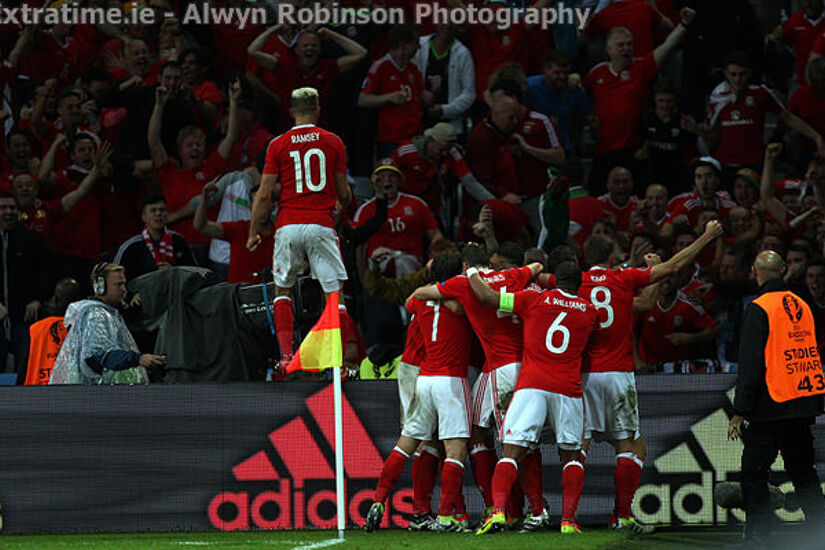Ireland v Wales: Ireland's second-oldest fixture

Credit: Al Robinson (ETPhotos)
2016 was a remarkable year for Ireland as a nation. From the commemoration of the 1916 rising and a maiden test rugby victory over the All Blacks to a government overhaul and an amazing soccer journey that reached its pinnacle when both Irish, Republic and Northern, sides reached the knockout stages at the European Championships.
And although the many tribute ceremonies marking the centenary anniversary of the Easter Rising are sure to be lifetime highlights for some, 2017 sees another rather notable event honoured in the most fitting way possible.
On February 25th, 1882, seven days after being thumped 13-0 by England in our earliest soccer international, Ireland faced the Welsh for the first time at Wrexham’s Racecourse Ground.
Ireland, mainly consisting of Northern Unionists, went down to a 7-1 defeat, the highlight being Samuel Johnston’s first-half equaliser, the first international goal scored by an Irish man.
The goal perhaps takes on more significance seeing as the Distillery man, who would play five times for his country, was only 15 years and 154 days old when writing his name into national folklore.
That couple of defeats brought Ireland’s aggregate concession across the two games to 20, a figure hardly plausible in modern day football where ‘three-at-the-back’ and ‘hit them on the break’ tactics dominate the professional game’s discourse.
Since that humbling in north-east Wales, Ireland, and the side that split and became known as the Republic, have clashed with our cross-channel neighbours a further 74 times.
Wales lead the head-to-head reckoning by 34 wins (29 & 5) to 26 wins (21 & 5), although interestingly the silver jubilee of the Dragons' last win over Ireland passed on February 19th.
Times have certainly changed since the famous meeting of 135 years ago and the stats reflect as much: Ireland have won three of the last six meetings, the most recent of which came in a 2011 Nations Cup tie in Dublin.
In fact, Wales have beaten the Republic of Ireland only twice in the last ten meetings, a record hardly plausible in decades and generations gone before where the British legion had somewhat of a monopoly over a nation suffering political oppression, social upheaval and a blanket GAA ban on members playing ‘foreign games’.
There has not only been a dramatic change in the fixture over the past century, though. The decade spanning from our last competitive meeting in November 2007 right up until the present point, where we await an acquaintances renewal with an old foe, has cast dramatic change on the fortunes of both.
That meeting at a three-quarters empty Millennium Stadium was diabolical in so many ways. Wales were counting the cost of a generation who promised so much but ultimately failed to replicate their club standards on the international scene, while Ireland were in therapy after the Staunton debacle.
The teams, substandard in personnel and lacking spark and hope, failed miserably. A 2-2 draw on the surface would suggest a decent spectacle, it was anything but though.
Especially from Ireland’s point-of-view with Paul McShane’s penalty concession and John O’Shea’s ball-watching ultimately costing Don Givens’ team a victory to round off a forgettable campaign, Cyprus included.
Wales for their part were equally as sorry with their panel bulging with English third-division dwellers and proverbial no-hopers. Ireland finished third in the group, a considerable 10-points off the play-off spot, with Wales two spots further adrift in fifth.
Disappointing for both, although John Toshack did pull off a masterstroke in giving a certain Gareth Bale his international bow during that campaign.
Since then, the Irish have been to two major championships while Wales made it to the semi-finals of last summer’s European Championships.
Gareth Bale, Aaron Ramsey and Ashley Williams lead their cause – a long way from the Carl Fletchers, Freddy Eastwoods and Neal Eardleys who featured in Cardiff a decade ago. Ireland, likewise. Long be the days of Lees Miller and Carsley in midfield.
Friday night promises to be a thriller, no matter the injury, fitness and form doubts hanging over both squads.
There is a upside; it can’t be any worse in terms of build-up and quality than ten years ago, nor can it be as one-sided as 1882 when Ireland were demolished.
And you never know, Martin O’Neill may just unearth a 15-year-old to fill Robbie Brady’s boots and put Ireland a step closer to Russia!

